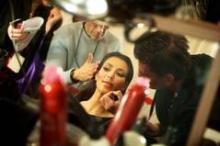The public debate about whether television and movies influence personality or behavior usually focuses on violence – does violent content increase the likelihood of violent behavior?
Dr. Audrey Longson began worrying about a different trait – narcissism when she saw her younger sister’s crowd become big fans of reality TV shows. You know, the kind of TV shows whose subjects are vain enough to assume that their lives are so interesting that millions of people should tune in every week and watch them.
She wondered whether excessive viewing of reality TV shows, which claim to portray "real life," might normalize narcissistic behaviors and contribute to a higher prevalence of narcissistic tendencies.
Or, as Dr. Longson put it, "Is ‘Keeping Up With the Kardashians’ keeping you down?"
In simple terms, narcissism is defined as a personality trait characterized by egocentricity, excessive vanity and pride, and self-serving behavior that’s often detrimental to others. Traditionally, psychiatrists have looked to a patient’s "family of origin" as a potential cause of narcissism, but other environmental influences are getting increased attention.
Dr. Longson, her sister, and a male cousin recruited 159 adult survey subjects through posts shared on Facebook that redirected participants to three Web-based surveys: the Narcissistic Personality Inventory (NPI); the Rosenberg Self-Esteem Scale (RSE), and a questionnaire about demographics and reality TV viewing practices.
Watching reality TV didn’t appear to predict the development of narcissistic traits, but it’s too soon to dismiss the idea of reality TV viewership as an environmental factor related to narcissism, her findings suggest. It’s just unclear whether the narcissism is the chicken or the egg, said Dr. Longson, who is in private practice in Teaneck, N.J.
She found some trends suggesting that the kind of reality TV show might matter. People who watched voyeuristic shows such as the Kardashians or one of the "Real Housewives" iterations were more likely to feel that they had power over others and that they were more special than others. Watching skill-based reality shows such as "Survivor" also was associated with higher "special person" scores, but not as high as with watching the voyeuristic shows. The skill-based viewers also showed modestly increased scores for exhibitionism.
Watching educational reality shows, on the other hand, produced no statistically significant association with narcissistic traits. In fact, there were hints of a mild inverse relationship – watching the educational shows might be associated with less-narcissistic NPI scores, Dr. Longson said at the annual meeting of the American Psychiatric Association in San Francisco.
It’s difficult to determine if watching certain kinds of reality TV is a cause or a symptom of narcissism (or neither), but there’s enough here to warrant more research, she believes.
And it’s enough for Dr. Longson to offer some advice to her sister’s crowd and to society as a whole: "In our increasingly consumer-driven culture, we should take a moment and stop and consider what we’re consuming."
Dr. Longson reported having no financial disclosures.
On Twitter @sherryboschert


